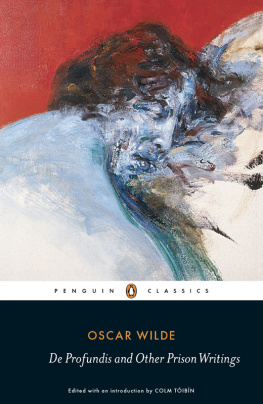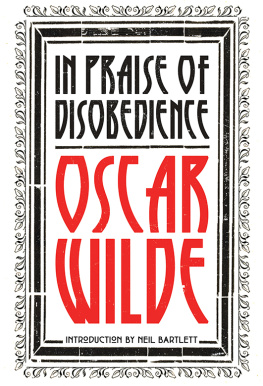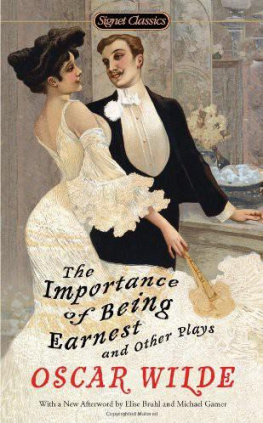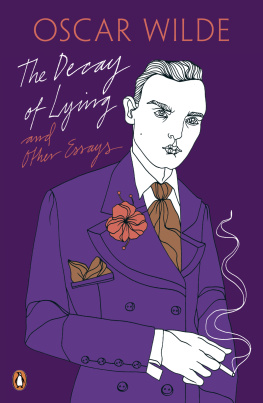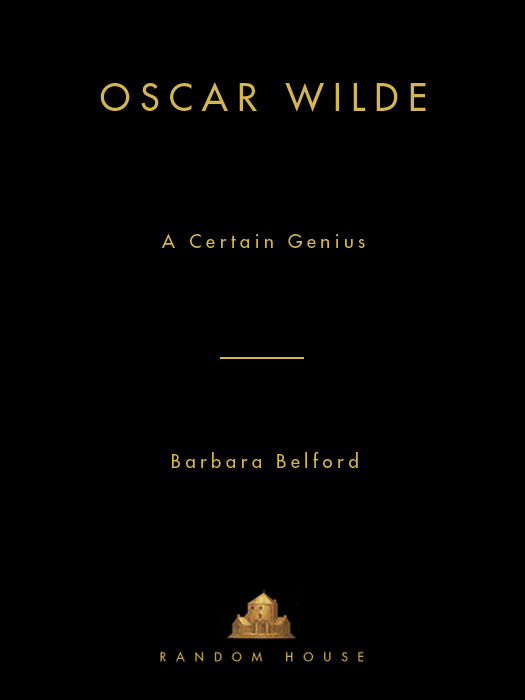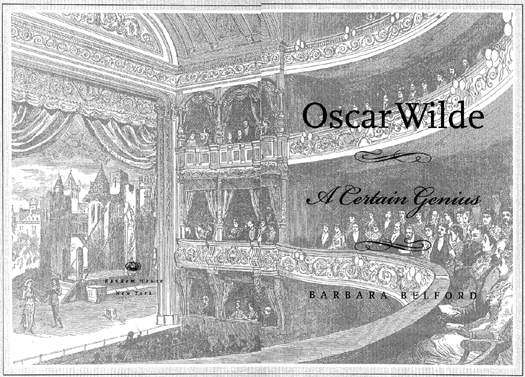All rights reserved under International and Pan-American Copyright Conventions. Published in the United States by Random House, Inc., New York, and simultaneously in Canada by Random House of Canada Limited, Toronto.
R ANDOM H OUSE and colophon are registered trademarks of Random House, Inc.
Grateful acknowledgment is made to the following for permission to reprint previously published material:
Fourth Estate Ltd.: Excerpts from The Letters of Oscar Wilde, edited by Merlin Holland and Sir Rupert Hart-Davis. Letters copyright 1962, 1985, 2000 by The Estate of Oscar Wilde. Editorial matter copyright 1962, 1985, 2000 by Sir Rupert Hart-Davis and Merlin Holland. Reprinted by permission of Fourth Estate Ltd.
Henry Holt and Company LLC: Excerpts from The Complete Letters of Oscar Wilde, edited by Merlin Holland and Sir Rupert Hart-Davis. Letters copyright 1962 by Vyvyan Holland. Copyright 1990, 1997 by Merlin Holland. Reprinted by permission of Henry Holt and Company, LLC.
INTRODUCTION

O Scar Wilde was a dazzling conversationalist: once heard never forgotten. His life was the triumph of flippancy over genius, and sometimes the triumph of genius over flippancy. He needed a paradoxical nature to create his brilliant antithetical views on the English and the Irish, male and female, truth and artifice, good and eviland himself. By writing about serious issues that are still relevantthe corrosive effects of power, the quest for status, and class pretensionshe sums up what is past, embodies what is passing, and intimates what is to come. By flaunting the right to his own sexuality, Wilde catapulted Uranian passion out of adolescence and into maturity and gave birth to a homosexual consciousness. Anticipating modernism, he saw the value of interpreting and criticizing culture through ones personal visions. His life impinges on us still.
Wilde experimented with all literary forms: journalism, criticism, poetry, fiction, and biography; along the way he illuminated Aestheticism, Decadence, and Symbolism. He taught us that style not sincerity is what matters. As the author of The Importance of Being Earnest, the wittiest comedy of all time, rivaling even the works of Molire and Shakespeare, he changed the sound of laughter. His dramas taunted the English with the folly of their ideals and their hypocrisy. Once attacked as derivative, his words now make the unoriginal enlightened; present-day writers plunder his work searching for an epigram to say what they cannot about contemporary life. Nol Coward, Terence Rattigan, Ronald Firbank, P. G. Wodehouse, and Evelyn Waugh owe as much to Wilde as do the dramatists Joe Orton and Tom Stoppard, Paul Rudnick, Tony Kushner, Terrence McNally, and Larry Kramer, who like Wilde attack the certainties and presumptions of the so-called normal life.
Any new biography brings Wilde, and his age, before another jury to be retried and judged. In his lifetime the end of Victorianism and all that it had come to represent was approaching, but nothing had evolved to take its place. It was Wilde who defined the conscience and the consciousness of the artist at a time when all other values were thrown into doubt. My aim has been to reclaim Wilde in all the brilliant details of his contradictions as he appeared to his contemporaries and to argue that his writing as well as his life has a certain genius.
Hundreds of books have been written about Wilde. Most have stumbled when it came to humanizing the arrogant poseur. The first to succeed in capturing his extraordinary charisma and conversational abilities was Oscar Wilde: His Life and Wit (1946), written by Hesketh Pearson, a former actor who was ten years old when Wilde was released from prison. Early Wilde scholarship was dominated by H. Montgomery Hyde and Rupert Hart-Davis. A lawyer, Hyde edited The Trials of Oscar Wilde in 1948 from newspaper sources since there were no official transcripts and wrote a biography in 1975. Hart-Davis published a collection of Wildes letters in 1962 and a supplement in 1985.
Modern Wilde scholarship begins with Richard Ellmanns Oscar Wilde (1987), the comprehensive biography against which all subsequent works will be judged. Recent books have tended to take specialist views. We have the Irish Wilde, the gay Wilde, and the Freudian Wilde. Ellmanns approach, in many ways critically astute, suffers from a reticence about discussing his subjects homosexuality as more than a private matter: it is divorced from contemporary politics and culture. Strong on the facts but weak on cultural context, particularly the conditions and personalities of the contemporary theatre that had so much of an impact on Wilde, it is not a dramatic biography or one that provides a sense of time and place. Ellmann wrote the tragedy of Wilde, not the life.
As much as I am indebted to Ellmanns scholarship, I must disagree with his thesis that Wilde contracted syphilis from a female prostitute at Oxford, that it influenced his work and hastened his early death. Those aspects of Wildes life and personality that did not fit this argument were glossed over. One wonders whether Ellmanns insistence on syphilis was an effort to give Wilde some heterosexual patina to make him more sympathetic. Indeed, Wilde himself said that each biography is its own fiction because at best it takes a stance oblique to the truth. When one looks at the facts anew, Wildes medical history makes syphilis difficult to substantiate.
The problem in writing any new biography of Wilde is that he comes to us with his life already written, so much of his anecdotal history precedes specific knowledge of any actual details of it. The first mythologizing and fictionalizing was by Wilde himself. So why another book about him? And why now? Because his life is a continual allegory and his social, political, and artistic views, which went right to the heart of Victorian society, are no less threatening today. Because his obsessive love for Lord Alfred Douglas is one of the nineteenth centurys extraordinary love stories. He is a major figure in world culture and needs a fresh look. What better time to publish a new life than the centenary of his death, November 30, 2000?
I came to know Wilde through the women he loved. My first biography was of Violet Hunt, who claimed that she nearly became his wife in the 1880s. Her life introduced me to the Pre-Raphaelites, who inspired Wildes own brand of Aestheticism. My next biography was of Bram Stoker, who brought me to Dublin and Trinity College, where he and Wilde were born and studied. Stoker ended up marrying Wildes college sweetheart, Florence Balcombe. Best known as the author of Dracula, Stoker was business manager for Henry Irving and the Lyceum Theatre for three decades. His life initiated me into the West End, its theatres, clubs, and restaurants. Finally, The Happy Prince, a childhood story that awed me with its themes of love, hope, and death, pulled me into five years of getting to know the inner Wilde. I discovered that his childlike nature extended to all his worksfrom


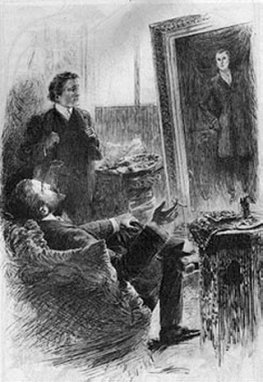
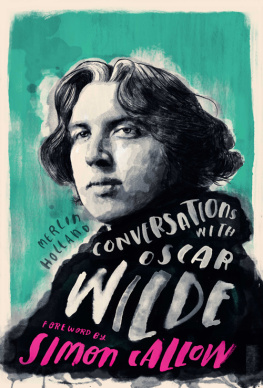
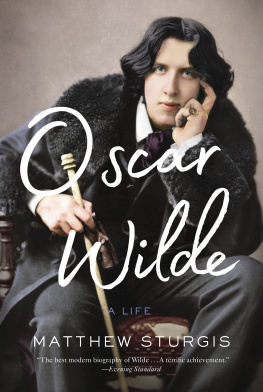
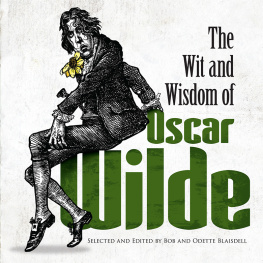
![Wilde Oscar - The secret life of Oscar Wilde: [an intimate biography]](/uploads/posts/book/228457/thumbs/wilde-oscar-the-secret-life-of-oscar-wilde-an.jpg)
